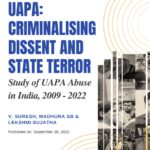‘Pattern’ of UAPA Being Abused / You spent 10 years in jail for nothing. Who should pay for it?

Elgar Parishad Case: Bail Orders Show ‘Pattern’ of UAPA Being Abused
14/04/2024
The Quint / by Rohit Khannna
The SC recently granted bail to activist Shoma Sen, stating the allegations against her were prima facie not true.
On 5 April 2024, the Supreme Court granted bail to former Nagpur University professor and activist Shoma Sen, stating that the allegations against her – of indulging in terrorist activities or working for a terror group – were prima facie “not true”, and that no case was made out against her for offences under the extremely stringent Unlawful Activities (Prevention) Act or UAPA.
Shoma Sen is among the 16 accused in the Elgar Parishad case, all of whom were arrested under the UAPA.
Read more
Video: Elgar Parishad Case: Bail Orders Show ‘Pattern’ of UAPA Being Abused
By The Quint

en | 5:12min | 2024
Watch video
The Reichstag Fire & Prof Shoma Sen
14/04/2024
Newsclick / by Prabhat Patnaik
There’s a striking contrast between German judiciary stance during Hitler’s time and Indian judiciary’s on the executive’s trampling upon the Constitution.
… Professor Shoma Sen of Nagpur University was granted bail on Friday, April 5, by the Supreme Court, after she had spent six years in jail as an accused in the Bhima-Koregaon case. While granting her bail, the Supreme Court said in no uncertain terms that there was no prima facie case of her being associated with any acts of terrorism or being linked to any terrorist organisation. And yet she had to spend six years of her life in jail, which raises two fundamental questions: first, shouldn’t the government be held responsible, and hence be penalised in some way, for her extremely long incarceration without any trial, and that too on non-existent grounds according to the Supreme Court itself?
And, second, what were the various courts doing all these six years, letting her languish in jail, when they were duty-bound under the Constitution to protect her fundamental rights?
Read more
You spent 10 years in jail for nothing. Who should pay for it?
12/04/2024
Times of India / by Sunil Baghel
What connects three professors — from Delhi, Kolhapur and Nagpur — to 17 residents of a village in Madhya Pradesh? All of them spent time in jail as undertrials or convicts before they were either acquitted or granted bail due to lack of evidence, with the courts questioning the cases against them.
… Under the stringent UAPA — where getting bail is even harder than other criminal cases — more than 24,000 people were accused in 5,027 cases registered between 2016 and 2020.
The data revealed in response to a question in the Rajya Sabha showed that just 212 people had been convicted in these cases, and 386 were acquitted. As per the data, nearly 98% of those arrested under the law had been imprisoned for multiple years just awaiting trial or to get bail.
Read more
Also watch/read:
▪ Spotlight | How UAPA is Crushing Dissent in India
The Wire’s new show, ‘Spotlight’ / by Zeeshan Kaskar

en | 15:16min | 2024
In Episode 4 of The Wire’s new show, ‘Spotlight’, we understand the UAPA, its history and how the 2019 amendment of the law has pushed India’s legal justice system on the brink.
Watch video
▪ Explained: The Shoma Sen bail judgment (The Leaflet / April 2024)
▪ Can Father Stan Swamy’s PIL be the blueprint for justice to thousands of undertrials lodged under UAPA? (The Leaflet / Aug 2023)
▪ Report: UAPA – CRIMINALISING DISSENT AND STATE TERROR (PUCL / Sep 2022)

Download report
▪ Punished without trial: How India’s political prisoners are being denied basic rights in jail (Scroll.in / Aug 2022)
▪ A study of Undertrials in Jharkhand (Sanhati / by Bagaicha Research Team / Feb 2016)